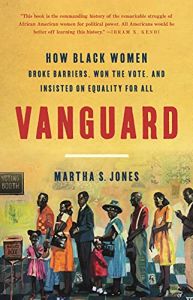
Vanguard
How Black Women Broke Barriers, Won the Vote, and Insisted on Equality for All
Recommendation
Most people know about the contributions of Elizabeth Cady Stanton and Susan B. Anthony in securing rights for women in the United States, but few are aware of their Black female contemporaries, leaders who worked for decades first to abolish slavery, then to secure universal suffrage. Black women leaders continued the long push to exercise their rights despite Jim Crow laws and discrimination meant to suppress their votes. They helped build the civil rights movement of the 1960s. Martha S. Jones recounts the stories of the unsung heroines who led the long struggle for Black political equality and women’s suffrage rights.
Summary
About the Author
Martha S. Jones is the Society of Black Alumni Presidential Professor and history professor at Johns Hopkins University. She also wrote Birthright Citizens: A History of Race and Rights in Antebellum America and All Bound Up Together: The Woman Question in African American Public Culture.







Comment on this summary